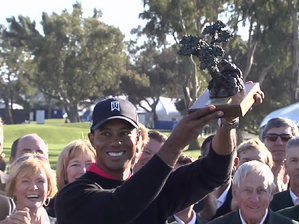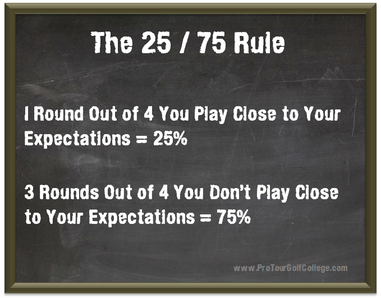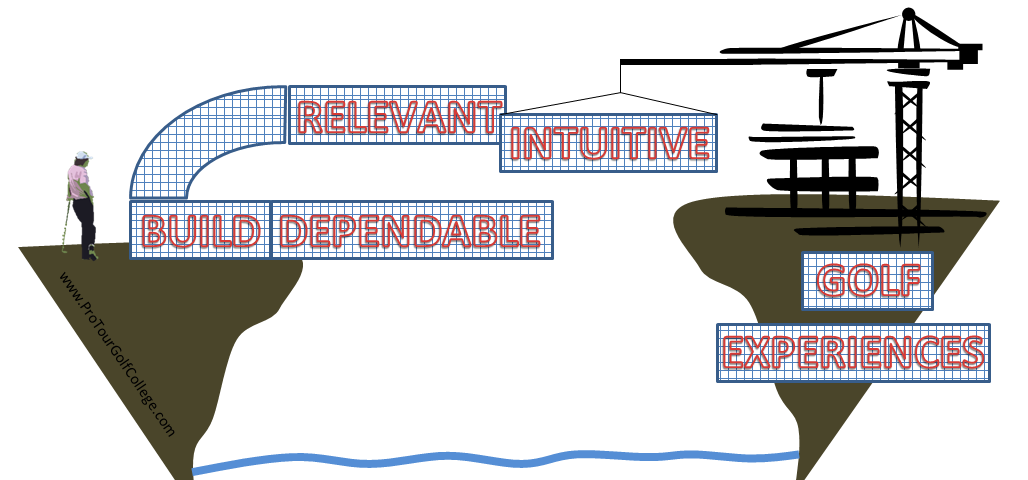How to Become a World Class Golfer: Before You Begin You Must Know This Important Rule (Part 2)23/10/2014  Last week we discussed the importance of developing the idea of becoming a world class golfer into a vision statement where you describe as clearly as you can where you would like your game to be in 5 to 10 years. But realistically what are the odds of you becoming a world class professional golfer? Well, on the face of it, not very good. If you look at all the male and female professional golfers competing on professional golf tours around the world and you took their average income earned over a season, very few professional golfers earn more than 50,000 dollars or its equivalent in a season. On top of this, most will give up on their dream within 3 to 5 years of starting out because they find the daily grind of travelling, competing, and for the most part falling well short of their performance expectations (missing too many cuts and earning a meager income) soul destroying. However there are some professional golfers who refuse to give up and keep turning up to play no matter how tough it is. They keep finding big enough reasons to keep competing even when down to their last dollar. They are driven by their dream that one day they will play the way they truly want, become a top ranked golfer, and win a big tournament, and gain fame and fortune playing big time golf. I’m sure you can appreciate that the most successful golfers are those that keep moving forwards, continually finding ways to improve their game and become more competitive in tournaments?  There is the argument that they have more talent than the next guy or gal, but is debatable, because many of the golfers who have risen to the top of golf’s totem pole throughout history were often considered lesser golfers by the “experts,” and far from talented golfers. Aren't we lucky that these tough golfers refused to listen to the naysayers and knockers? Having worked with many tour players and elite amateur golfers over the years we have noticed that one of the biggest stumbling blocks for many serious golfers is not that they don’t know how to play the shots, or that they don’t have the ability to become a top class golfer. What we have noticed is that those amateurs and professionals that keep playing and improving their game definitely have a better way of managing the struggle. What is the struggle? The struggle is those frustrating and annoying golf days where it seems like whatever you do it is a long way from your expectations, and you feel like you want to give up the fight, you want to stop trying to manage your score, but you know that you can’t. Have you heard the saying “it’s not the dog in the fight; it’s the fight in the dog?” Do you have a high tolerance for misfortune and adversity? You better if you want to become a top 100 golfer. The real skill to becoming a world class golfer is the ability to keep upgrading your golf skills to make it easier to manage the struggle, and as simple as this sounds, believe me it is the biggest challenge you will face. Let me say it again; the real skill is upgrading your golf skills to manage the struggle. Manage the struggle and you manage the score.  We describe the struggle with the 25/75 rule for 4 round tournaments. Basically the 25/75 rule states that just 1 round out of 4 (25%) will be much closer to your expectations, and that 3 rounds out of 4 (75%) will be a long way from your expectations, and it will be a struggle to score well. Therefore the idea behind this rule is to know and accept this as being a normal part of top level golf. What kind of mind-set would you need to develop if you accept the 25/75 rule as normal? What elements of your game would you develop knowing that 3 rounds out of 4 could very likely be a struggle to score well? Interestingly we find that many of the elite golfers who struggle with their game on a continual basis can and often do see this rule the other way around. They see golf as a 75/25 game with 75 percent of their golf played close to their expectations, and 25 percent that is not close to their expectations. What kind of mind-set would this golfer develop? Think about this for a moment because it is very important. This in our opinion is the difference between striving for excellence verses striving for perfection. There is no room in top level golf for perfectionists (sorry), but there is plenty of room for excellence—where excellence describes the attitude of continually striving to improve, and perfection is a golfer continually striving to be perfect, or to play perfectly—without mistakes.  Matt Jones reacting favorably to a holed pitch to win on the PGA Tour Matt Jones reacting favorably to a holed pitch to win on the PGA Tour Golf is a scoring game built around reducing mistakes (not avoiding them) by constantly managing your emotional content. It seems to me that if you can develop the knowledge of how to do this, and improve the mental skills that will hold you back from making progress – before you start out on your journey towards becoming a top class golfer, it would make a lot of sense. So what does the research tell us about world class individuals? What is the personality profile of a world class athlete? (Pay close attention to this) Well according to an analysis of the research literature by William P. Morgan, University of Wisconsin-Madison emeritus professor and renowned sports psychologist, the psychological profiles of elite athletes are superior to those found for lower classification athletes as well as the general population. In terms of psychological states, world class athletes scored low in; a) Tension b) Depression c) Anger d) Fatigue e) Confusion On the other hand they scored extremely high in; a) Self-confidence b) Mental toughness c) Determination. This psychological profile was found to be noticeably different to the profiles found for non-elite athletes and also the normal population. Remarkably, it was also discovered that non-elite athletes have almost the same psychological profile as the general population. They were inclined to experience a higher level of anxiety, confusion, depression, fatigue and anger than their elite colleagues, and they also showed significantly less confidence, mental toughness and determination. Source: http://strengthplanet.com/other/15-surprising-facts-about-world-class-athletes.htm At Pro Tour Golf College our students are constantly educated to understand these performance limitations well before they make the move to qualify for a professional golf tour. We want them to build a sturdy golf success bridge, and before you start constructing your bridge you need to know the possible challenges along the way. This is an important part of your preparation, and when you think about it, can you think of anything worthwhile and enduring (like a bridge) that was constructed without a comprehensive knowledge of all the things that could go wrong?
Well it is no different building your golf success bridge. When you think about building your bridge you will find it helpful to use the B.R.I.D.G.E acrostic. Build Relevant Intuitive Dependable Golf Experiences Because golf is a game of constant highs and lows you need a way of managing it so you can keep on top of your ability to manage your scoring ability during your round. In next week’s article (part 3 of our series) we’ll show you how to build your B.R.I.D.G.E with relevant, intuitive and dependable golf experiences to help you develop a game that can manage the normal up's and down's of the game so you can take your game all the way to the top. See you then. Lawrie Montague and David Milne - Pro Tour Golf College Your Success On Tour is Our Business
3 Comments
26/4/2019 04:11:09 pm
You made me realize that I must be mentally strong when playing golf because a lot of misfortune is bound to come my way so I must learn how to get past them. I think being able to manage the struggle in the game is the best attitude that you can have. Once I am able to have someone profile me, only then will I finally realize what you mean by striving for excellence versus perfection so I'll be sure to attend a workshop while I can so I can be mentally better.
Reply
Leave a Reply. |
Archives
June 2019
|
Proudly Supported By
Copyright © 2011 - 2018 Pro Tour Golf College
Website Managed By Golf Performance Media
All Rights Reserved
Website Managed By Golf Performance Media
All Rights Reserved



 RSS Feed
RSS Feed



